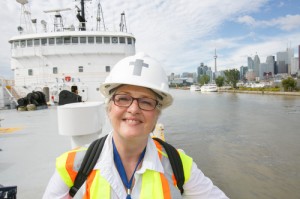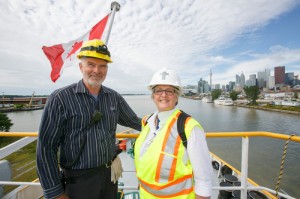
By Carolyn Purden
Less than a year into the job as executive director and chaplain of the Mission to Seafarers in Southern Ontario, the Rev. Judith Alltree is clear about where her priorities lie: “It’s about the seafarers,” she says. “We have to put them first.”
The shipping industry has changed dramatically since 2008, and the Anglican mission to those who work on the ocean “salties” and Great Lakes “lakers” has to change with the times. As a result, it is revitalizing its port ministries and adopting a more missional approach.
Ms. Alltree was appointed interim director of the Mission to Seafarers in Toronto in April 2013, pending its amalgamation with the mission in Hamilton. A year later, she was appointed executive director of the newly amalgamated mission, which serves not only Hamilton and Toronto, but also Oshawa.
In the past, seafarers would come to the mission station once the ship had docked. Now they often do not have the chance to leave the ship, so the mission comes to them. “Sixty to seventy per cent of what we do is ‘going out,’” she says.
This new approach needs people, and Ms. Alltree is anxious to find volunteers who can be trained as ship visitors. Crews come to the Ontario ports from around the world, and it would be an advantage if the volunteers could speak a language in addition to English.
Above all, they need to be good listeners. Seafarers are away from home for months at a time and often, as was the case with a Ukrainian crew this summer, they leave behind a precarious situation at home.

“We are dealing with a multi-faith, multi-denominational, no-faith world,” says Ms. Alltree, adding that the universal need of seafarers is to have someone to listen to them.
Volunteers should also be ready to work irregular hours with as little as a day’s notice. Ships arrive late and leave early, and the mission wants ship visitors to be there as soon as they arrive.
Ms. Alltree also hopes to attract people with social media and graphic arts skills who will, among other things, produce an electronic newsletter. The most important challenge facing the mission is to develop more connections with local Anglican communities in Toronto and Oshawa, and also with ecumenical and interfaith ministries.
One of the high points this summer came when a German ship was abandoned in Oshawa, with the Romanian crew left aboard, unpaid. The mission found a Romanian Orthodox church in the port area and contacted the pastor and his wife, who rallied their church community to welcome the crew into their homes, take them to church and give them moral support.
“Now we have a connection in the port with another Christian denomination, and they want to become involved in the mission,” says Ms. Alltree.
She is also determined to connect seafarers to local communities, especially the thousands of people who are coming to live in the newly developed Distillery and Canary districts. She points out that 90 per cent of everything we use comes to us on a ship, but the people who bring these goods here have become invisible to us.
“Connecting the seafarers with the local communities where their products are first brought makes a difference in their lives,” she says. “They feel somebody cares about the work that they do, that they don’t disappear into the ether after the cargo gets discharged. That’s really important to us at the mission.”